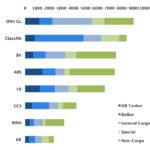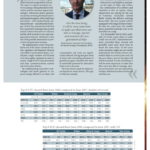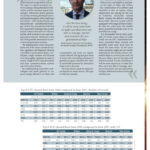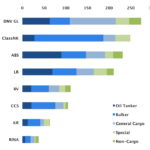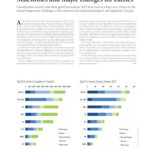With an eye on the major trends, the classification societies focus concrete projects, research and customer orientation. Bigger M & A upheavals are not high on the agenda. The annual HANSA report by Michael Meyer
The emphasis on customer orientation, rediscovered in the crisis years, is still considered an essential resource. Though many and profound[ds_preview] changes are expected in shipping, this is not necessarily true for »own« competition. With regard to the technologies of the present and the near future, the classes rate LNG as the most advanced. In other segments, widespread implementation apparently still lacks marketability (batteries) and specific regulatory framework conditions (autonomous shipping). All this is clearly reflected in the statements made to HANSA. For our annual report, the most relevant classes share their views and name challenges as well as chances and concrete reservations.
While a year ago the classes were still hearing a lot about »milestones« and »major changes«, today it seems that they are more concerned with relatively detailed tasks and concrete projects. There are many reasons for this: With the postponement of the Ballast Water Convention and, above all, the recent climate decisions of the IMO, two major milestones have been passed. Even the much-cited digitization is less discussed as a phenomenon in itself. Rather, the transformation is in full swing – it’s about E-Certification, Process Optimization, Digital Twins, Remote Control and much more.
The same applies to the second dominant topic: alternative drive technologies. After years of, above all, a fundamental debate about meaning and nonsense, the number of concrete LNG projects is steadily increasing. The gas propulsion is the most advanced for »global« use. It is not surprising that the classes call for further options, e.g. batteries. However, according to a widespread opinion, work must continue on technology and regulation. Concrete, global and realistic requirements are important and necessary. Regulation also appears to be a major stumbling block for the industry to implement autonomous or at least remote-controlled projects.
Last but not least, we asked stakeholders for their views on consolidating their own market. It becomes clear that most of the big classifications deal with growth, but in different ways – which may also be related to the different set-ups and the different embedding in state-official structures. »Internal« (within sector) acquisitions do not seem to be an option right now. Class societies rather want to continue to optimize their own portfolios, be it through intensified research or the takeover of, or cooperation with, external specialist providers within or outside of the »classic« maritime industry.
Comment by Jamie Smith, Chief Business Development Officer, ABS
Because ABS is focussed on the marine, offshore and government market sectors and also across all the segments within these markets, we have been less affected by the trends that have pushed consolidation among other class societies.
Class has evolved substantially from a process of approvals to one of safely enabling innovation and the adoption of new technologies. That means delivering new services in new ways and not all class societies will be able to adapt to this new business model. It is possible that other classification societies may seek consolidation as a means of simply keeping up with the technology and service developments.
We know that even before the IMO’s 2020 sulfur cap comes into force, work will begin on the candidate measures to be adopted under the recent agreement to set carbon emission reduction targets. This work is expected to be a major challenge for the industry, as to achieve the necessary reductions will require the development, regulation and adoption of new and as yet untested.
If we accept that the internal combustion engine will still be required to provide the majority of the propulsive power for the foreseeable future, then alternatives such as LNG, LPG, Methanol and Ethanol will continue to increase their market share as new power sources such as Hydrogen and batteries come onstream.
LNG as fuel has proven its business case from a technology point of view but there are questions as to its long term suitability for meeting carbon emission reduction targets. It is likely that owners will consider LNG for at least another cycle of newbuildings but that over time, alternatives may begin to be favoured for compliance reasons.
The use of batteries is growing quickly. We are likely to see adoption increase for auxiliary applications on large vessels, as well as for primary propulsion on smaller craft.
The question of remote control/autonomous shipping is one of the most widely-discussed and arguably least well understood topics in the industry. We see a growing interest in adopting automation onboard ship, with autonomous and software integrated systems increasingly used to help improve the reliability and uptime of ship systems.
With greater connectivity, comes increased cyber risk – in both Operational and Information Technology – so part of ABS’s mission is to address this risk through our ABS CyberSafety programs and research.
What is often overlooked in this conversation is that the economics of a single-cargo, point-to-point short-sea route using a purpose-built ship are nothing like the Asia-Europe container trade or the tramp markets that make up the majority of shipping demand. The technology to support greater vessel autonomy such as AI and enhanced tools for situational awareness are finding their place in shipping, but the need for a regulatory framework, and not least, proven market demand, will impact the speed of adoption of autonomous ships.
Comment by Knut Ørbeck-Nilssen, CEO, DNV GL – Maritime
We will continue to enhance service delivery and new customer offerings during a period of digital transformation and new regulatory complexity. While continuously developing our rules to deal with emerging challenges and technologies such as, vessel automation, remote operation, and cyber security.
DNV GL has no plans to participate in any further consolidations in the classification market. But it cannot be ruled out that further consolidation will take place. Classification is an instrumental safety net within the shipping and offshore industries. We believe that competence and innovative capabilities e.g. in the digital transformation will require robust classification societies going forward.
Having just completed my time as IACS Chairman, the changing regulatory environment has been a particular focus over the last year. I remain convinced that international regulations that allow shipping to develop innovative practices and technologies are essential. It is important that the IMO and IACS regulatory frameworks keep up with the rapid rate of innovation. Increasing levels of automation requires regulators and the industry alike to take a fresh look at the relevant regulations.
Over the next five years we will see more diversity in the fuel mix, especially as the 2020 regulations on sulphur come into force. On LNG, our most recent count is 124 ships in operation with 133 on order. This could accelerate as we get closer to 2020, but will still be a relatively small part of the world fleet.
Other alternative fuels such as hydrogen, methanol and biofuels, are emerging but uptake is for niche applications. Batteries, and to a lesser degree fuel cells, will be most relevant for short-sea shipping. Scrubber ordering is accelerating but the total count is less than 1,000 units either installed or ordered. We don’t expect this to increase much above 2,000 units by 2020 so the uptake will be limited compared with the world fleet.
Autonomous shipping is likely to have some uptake in some coastal trades over the next five years. In the deep sea sector, this is unlikely as global regulations are not in place. However, we are likely to see benefits in terms of improved performance, maintenance, and safety as vessels become more connected.
Comment by Taira Narisawa, General Manager of Public Relations, ClassNK
ClassNK always commits to provide the best service that responds to clients’ needs and to support those clients with challenges they may be facing. Taking our electronic certificates system and GBS-SCF compliant data center as examples, we have identified the need for such solutions, collaborated with industry players to make them more convenient and practical, and became the first to release them in the market. Through this approach, we will keep on providing the best competitive service for the unprecedented transitions in digitalization and environmental challenges.
Speaking only on behalf of ourselves, we do not expect to be involved in takeovers or mergers in any way.
The industry may find the necessity for any kind of regulation or guidance that would ensure sound utilization of maritime digitalization. Not only the cyber risks which the IMO and other organizations have already worked on, but also the handling of data such as its exchange, property, and quality may be a potential topic of interest.
There are currently over 120 LNG-fueled vessels in operation with many more in being ordered. If all of these orders are successfully carried out, there will be over 210 LNG-fueled vessels excluding LNG carriers and inland water vessels in operation by 2023.
It is also expected that the use of rechargeable batteries as a propulsive power source for small vessels in harbors etc. will increase to some extent. However, without a major breakthrough in technological innovation, their widespread use by standard merchant ships is not likely in the next five years due to limits in output, range, and charging time.
As the onboard duties performed by crew are complicated and include a broad range of tasks, the development of autonomous/remote control of vessels will likely advance in a gradual and step-by-step manner in the next five years. Taking this into consideration, ClassNK released its Guidelines for Concept Design of Automated Operation/Autonomous Operation of ships at the end of May as a reference.
Comment by Nick Brown, Marine & Offshore Director, Lloyd’s Register
A
s with most industries, scale is of critical importance. It is important because it offers the advantage of maintaining sufficient capacity to facilitate innovation, co-creation with our clients and research and development in line with the continuous acceleration of technology, safety and environmental expectations from our society in this 4th industrial revolution.
Over the past three years, we have been pleased to see our market share grow significantly, thus supporting our ambitions in innovation and R&D. We will continue with our focussed approach, placing our client’s needs and the quality of our service delivery at the heart of what we do. We expect to continue our position as one of the leading providers of classification, certification, and assurance in the Marine and Offshore industry for the future, as well as the present.
Firstly, regulation needs to be practical and global, ensuring a level playing field. Advances in technology and the opportunities this brings to reduce GHG emissions from our industry as well as reduce our carbon footprint should be welcomed. However, as with the initial LNG-Fuelled projects we need to work within a risk-based regulatory framework initially, to gain experience from such technology or alternative fuels and then bring this experience together to support practical regulation that encourages innovation and environmental and safety improvements.
In 2014, our Global Marine Fuel Trends 2030 report suggested 11% of deep sea shipping could be using LNG as a fuel. We now see this being an underestimate. As the LNG supply chain takes shape and the 2020 Sulphur limit accelerates the move away from HFO, more deep sea ships are being ordered with LNG as a fuel option.
We also believe the industry will welcome the increased adoption of greater levels of autonomy in shipping, thus allowing technology to do what it can do best and allow those crew on board to spend more time on tasks where their skills and experience can add the greatest value. As remote diagnostics and increased remote analytics of ship performance and ship operations builds on greater sensor reliability and cheaper data transmission costs, we see the role of the seafarer moving away from »maintenance and operation« to a much greater focus on »operation«, with maintenance being carried out in planned periods by specialists teams and SMEs.
Comment by Lee Jeong-kie, Chairman & CEO, Korean Register
As a result of the growth of the Internet of things and increasing technological breakthroughs, the maritime industry is more and more digitalized. We are already able to see that the traditional way of constructing vessels or operating fleet is being enhanced with digitalization.
Examples of our new initiatives include the launching of drone surveys last year, which reduce customer costs and downtime, and significantly improves surveyor safety during the inspection process. Another such development is the extensive technological research conducted by the Cyber Security Task Force team following the development of the KR Cyber Security Guidelines.
To enhance our core competencies as a class, KR has upgraded its SeaTrust software which is used to support effective and robust vessel design. In addition, the fleet management program, KR e-Fleet V2 has been significantly updated to include and integrate all the necessary preparations for survey and audit, allowing customers to simplify the process of managing surveys across their fleet.
KR does not currently have plans for any takeovers or mergers in the short term. However, we regularly work in partnership with companies from different industries as well as the maritime sector to conduct research and deliver specific projects. Overall, KR’s priorities will continue to focus on its strategic and practical cooperation with other companies in and out of the maritime industry, instead of takeovers and mergers in the short term.
Over the next five years, KR believes that the development of LNG fuel systems must be the core focus for the maritime industry. The imposition of the global Sulphur Cap 2020 has focused attention and the initial IMO (International Maritime Organisation) strategy for GHG reduction is boosting the development and improving LNG related technologies, because of its relative cleanliness.
In addition to LNG fuel systems, study and research into clean energy is expected to increase as well. The initial IMO strategy is boosting interest in LNG fuel systems but there is a question as to how long it can last as an alternative fuel. LNG can offer an annual reduction in CO2 emissions of 25%. However, the Energy Efficiency Design Index (EEDI) requires the industry to reduce CO2 emissions by 5% each year, this means that over five years the cumulative CO2 reduction required by the EEDI will be 25%, which is the maximum reduction obtainable through the use of LNG. This raises the question of how long LNG can be regarded as a viable alternative fuel under the current EEDI regulations.
Huge investments in facilities like bunkering stations are needed for LNG’s widespread dissemination, as a result the real concerns about its profitability and the prospects for alternative clean energies like hydrogen will grow greatly. As a result, LNG’s potential market share fuel may be small, certainly for the next five years.
Comment by Jianhui Mo, Acting Chairman & President, China Classification Society
C
CS has no plans for consolidation projects like takeovers or mergers in the foreseeable future.
In the past decade, the international maritime legislation bodies have introduced many mandatory requirements. Today’s paramount priority is implementing these regulations, instead of rolling out new regulations. With the increasing level of automation, the industry may wish to reduce manning on board for the sake of cost control. In this context, the existing regulations need to be revised to address various levels of automation.
The proportion of LNG fuelled ships in the total world fleet is expected to keep growing in the next five years, due to the strict emission standards (»Sulphur Cap«), successfully issued plans and tax subsidies to encourage ships to use LNG and the rapidly growing number of bunkering stations.
Hydrogen is going to be the ultimate energy source, and there is huge potential for the marine application of hydrogen fuel cells. Now, this application is still in its infancy. In the next five years, the development of fuel cells as an alternative fuel is expected to be slow, due to: power of fuel cells, manufacturing (very expensive), storage (bunkering facilities are not popular because of high cost), knowledge and transportation (high-pressure hydrogen storage cylinders have a disadvantage of low quality efficiency, with a mass of stored hydrogen of only 5% to 10% of the total cylinder mass).
We believe that the unmanned ship will be the future trend in the long run and it will lead to overturning change. However, due to the current worldwide limitations of the technology, economy, personnel training and legislation factors, the autonomous/remote control ship will have more partial demonstration application rather than the large-scale commercial application. I’m afraid there will be no substantive change in market share within five years. There are three main reasons why intelligent ships will not have a big impact in the near future: Firstly, the mature intelligent system cannot be established in a short period of time. Furthermore, the actual experience of intelligent hardware and software running onboard is still to be accumulated. Finally, conventional shipping employees need enough time to complete the transformation.
Rome was not built overnight. The appearance of intelligent ships reminds the industry that there is still plenty of fundamental work in the way ahead. It’s worth noting that this is the golden period to overcome various basic technical and legal barriers.
Comment by Philippe Donche-Gay, Senior Executive Vice President, Bureau Veritas
T
he Bureau Veritas Group is the largest testing, inspection and certification (TIC) company in the world providing marine classification and offshore services. Our business is now significantly more diversified than many of our competitors and we expect to see increased benefits from our being part of the larger BV group. This is particularly the case with respect to digital and technology developments.
We see our organic growth continuing and we are likely – if not immediately – in the marine and offshore sector, to continue to grow through acquisition as well. We have said before that while we see consolidation in the classification sector as logical, we think that it is unlikely from today’s perspective. We can see the sector continuing the strategic acquisition of complementary businesses to expand capabilities.
Demand for LNG as a marine fuel is growing but predictions of the take-up of LNG as a marine fuel have been inaccurate – and slower than some suggested might be possible.
As with the growth in demand for LNG fueled ships, hybrid power systems and autonomous shipping are seeing growing interest, and there is greater understanding of their potential. Demand for hybrid power systems will only grow – we are seeing most interest for application in tugs, ferries and cruise ships but there are applications that could be suitable for conventional cargo ships as well.
Regarding autonomy, it is important to discuss »levels« of autonomy. Perhaps the industry has been a little distracted by the idea of a jump to unmanned ships. In this respect, the scoping exercise of regulations that IMO has just begun is of great importance. This regulatory scoping exercise focuses on the instruments and regulations which may have an impact on, or may limit the introduction of maritime autonomous surface ships, taking into account different levels of automation.
Ultimately, reliability, safety and economic benefits will determine the future role of remote monitoring and control, and the potential for any progression to unmanned ships.
In general, digitalization is transforming our business. Perhaps not as fast as some hope but we must all be prepared to evolve fast. But we also need to focus on the realities of client and stakeholder needs today at the same time as we are digitizing the future of classification. Of the tens of thousands of ships trading today, few will convert to more autonomous or gas fueled operations but they can benefit from the increased efficiency we are bringing with digital tools and capabilities.
Comment by Paolo Moretti, Executive Vice President for Marine Strategic Development, RINA
The environment must be protected, but this will require regulations to become progressively stricter. The quest to a green transport sector is causing a rising demand for low carbon and low emission engine technologies. Alternative power generation systems are being developed and replacing diesel engines, often implying a fuel switch – LNG, biofuel blends, methanol/ethanol – and ultimately hydrogen. In fact, the construction of the first ferry powered by hydrogen has recently started. Sooner than later we will see a further shift towards Li-ion and next-generation batteries. Methanol is also one of the possible alternatives to power fuel cell generation systems.
The digitalization trend will probably be one of the major reasons for further regulatory development. Remote controlled or autonomous ships, e-certificates, single window will all need to be thoroughly regulated in order to ensure a high level of data protection and keep communications systems safe from cyber attacks.
By implementing innovative technologies and smart policies to improve energy efficiency on ships, fuel consumption and costs are significantly reduced. Saving fuel goes hand in hand with controlling emissions of greenhouse gases, therefore the share of newbuilds powered by alternative fuels is set to increase.
The fuel choices made by shipowners depend on many factors. The type of ship, for example.
Besides LNG and given the current situation of ships, ports, infrastructure and logistics, and given the type of ships and routes, the combination of scrubbers and batteries is also an option. Many shipowners are opting for the use of batteries: Grimaldis hybrid RoRo vessels, for delivery starting from 2020. The new vessels will be equipped with mega lithium batteries that are, until now, the world’s most powerful batteries ever to be installed on a ship.
It is foreseeable that by 2025, probably 3/4 of the cruise ships on order could run on LNG. Autonomous/remote controlled ships, instead, will probably need some more time to reach the same share. In five years some operators might use not totally autonomous, but mainly remote-controlled ships in certain areas only. In the near future, most of the ships will still be manned. For the time being, it will be more important to make sure that crews are able to manage, operate and maintain the new generation of ships, that heavily relies on data and software use.
Michael Meyer





